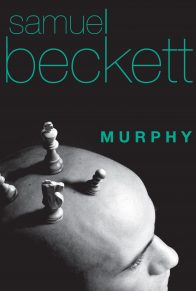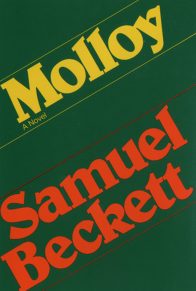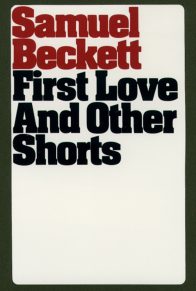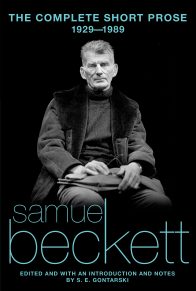I called her Mag, when I had to call her something. And I called her Mag because for me, without my knowing why, the letter g abolished the syllable Ma, and as it were spat on it, better than any other letter would have done. And at the same time I satisfied a deep and doubtless unacknowledged need, the need to have a Ma, that is a mother, and to proclaim it, audibly. For before you say mag you say ma, inevitably. And da, in my part of the world, means father. Besides for me the question did not arise, at the period I’m worming into now, I mean the question of whether to call her Ma, Mag or the Countess Caca, she having for countless years been as deaf as a post. I think she was quite incontinent, both of faeces and water, but a kind of prudishness made us avoid the subject when we met, and I could never be certain of it.
In any case it can’t have amounted to much, a few niggardly wetted goat-droppings every two or three days. The room smelt of ammonia, oh not merely of ammonia, but of ammonia, ammonia. She knew it was me, by my smell. Her shrunken hairy old face lit up, she was happy to smell me. She jabbered away with a rattle of dentures and most of the time didn’t realize what she was saying.
Anyone but myself would have been lost in this clattering gabble, which can only have stopped during her brief instants of unconsciousness. In any case I didn’t come to listen to her. I got into communication with her by knocking on her skull. One knock meant yes, two no, three I don’t know, four money, five goodbye. I was hard put to ram this code into her ruined and frantic understanding, but I did it, in the end. That she should confuse yes, no, I don’t know and goodbye, was all the same to me, I confused them myself. But that she should associate the four knocks with anything but money was something to be avoided at all costs. During the period of training therefore, at the same time as I administered the four knocks on her skull, I stuck a bank-note under her nose or in her mouth. In the innocence of my heart! For she seemed to have lost, if not absolutely all notion of mensuration, at least the faculty of counting beyond two. It was too far for her, yes, the distance was too great, from one to four. By the time she came to the fourth knock she imagined she was only at the second, the first two having been erased from her memory as completely as if they had never been felt, though I don’t quite see how something never felt can be erased from the memory, and yet it is a common occurrence. She must have thought I was saying no to her all the time, whereas nothing was further from my purpose. Enlightened by these considerations I looked for and finally found a more effective means of putting the idea of money into her head. This consisted in replacing the four knocks of my index-knuckle by one or more (according to my needs) thumps of the fist, on her skull. That she understood.
* * *
From Molloy
For I have always said, First learn to walk, then you can take swimming lessons. But don’t imagine my region ended at the coast, that would be a grave mistake. For it was this sea too, its reefs and distant islands, and its hidden depths. And I too once went forth on it, in a sort of oarless skiff, but I paddled with an old bit of driftwood. And I sometimes wonder if I ever came back, from that voyage. For if I see myself putting to sea, and the long hours without landfall, I do not see the return, the tossing on the breakers, and I do not hear the frail keel grating on the shore. I took advantage of being at the seaside to lay in a store of sucking-stones. They were pebbles but I call them stones. Yes, on this occasion I laid in a considerable store. I distributed them equally among my four pockets, and sucked them turn and turn about. This raised a problem which I first solved in the following way. I had say sixteen stones, four in each of my four pockets these being the two pockets of my trousers and the two pockets of my greatcoat. Taking a stone from the right pocket of my greatcoat, and putting it in my mouth, I replaced it in the right pocket of my greatcoat by a stone from the right pocket of my trousers, which I replaced by a stone from the left pocket of my trousers, which I replaced by a stone from the left pocket of my greatcoat, which I replaced by the stone which was in my mouth, as soon as I had finished sucking it. Thus there were still four stones in each of my four pockets, but not quite the same stones. And when the desire to suck took hold of me again, I drew again on the right pocket of my greatcoat, certain of not taking the same stone as the last time. And while I sucked it I rearranged the other stones in the way I have just described. And so on.
But this solution did not satisfy me fully. For it did not escape me that, by an extraordinary hazard, the four stones circulating thus might always be the same four. In which case, far from sucking the sixteen stones turn and turn about, I was really only sucking four, always the same, turn and turn about. But I shuffled them well in my pockets, before I began to suck, and again, while I sucked, before transferring them, in the hope of obtaining a more general circulation of the stones from pocket to pocket. But this was only a makeshift that could not long content a man like me. So I began to look for something else. And the first thing I hit upon was that I might do better to transfer the stones four by four, instead of one by one, that is to say, during the sucking, to take the three stones remaining in the right pocket of my greatcoat and replace them by the four in the right pocket of my trousers, and these by the four in the left pocket of my trousers, and these by the four in the left pocket of my greatcoat, and finally these by the three from the right pocket of my greatcoat, plus the one, as soon as I had finished sucking it, which was in my mouth. Yes, it seemed to me at first that by so doing I would arrive at a better result. But on further reflection I had to change my mind and confess that the circulation of the stones four by four came to exactly the same thing as their circulation one by one. For if I was certain of finding each time, in the right pocket of my greatcoat, four stones totally different from their immediate predecessors, the possibility nevertheless remained of my always chancing on the same stone, within each group of four, and consequently of my sucking, not the sixteen turn and turn about as I wished, but in fact four only, always the same, turn and turn about. So I had to seek elsewhere than in the mode of circulation. For no matter how I caused the stones to circulate, I always ran the same risk. It was obvious that by increasing the number of my pockets I was bound to increase my chances of enjoying my stones in the way I planned, that is to say one after the other until their number was exhausted. Had I had eight pockets, for example, instead of the four I did have, then even the most diabolical hazard could not have prevented me from sucking at least eight of my sixteen stones, turn and turn about. The truth is I should have needed sixteen pockets in order to be quite easy in my mind. And for a long time I could see no other conclusion than this, that short of having sixteen pockets, each with its stone, I could never reach the goal I had set myself, short of an extraordinary hazard. And if at a pitch I could double the number of my pockets, were it only by dividing each pocket in two, with the help of a few safety-pins let us say, to quadruple them seemed to be more than I could manage. And I did not feel inclined to take all that trouble for a half-measure.
For I was beginning to lose all sense of measure, after all this wrestling and wrangling, and to say, All or nothing. And if I was tempted for an instant to establish a more equitable proportion between my stones and my pockets, by reducing the former to the number of the latter, it was only for an instant. For it would have been an admission of defeat.
And sitting on the shore, before the sea, the sixteen stones spread out before my eyes, I gazed at them in anger and perplexity. For just as I had difficulty in sitting on a chair, or in an armchair, because of my stiff leg you understand, so I had none in sitting on the ground, because of my stiff leg and my stiffening leg, for it was about this time that my good leg, good in the sense that it was not stiff, began to stiffen. I needed a prop under the ham you understand, and even under the whole length of the leg, the prop of the earth. And while I gazed thus at my stones, revolving interminable martingales all equally defective, and crushing handfuls of sand, so that the sand ran through my fingers and fell back on the strand, yes, while thus I lulled my mind and part of my body, one day suddenly it dawned on the former, dimly, that I might perhaps achieve my purpose without increasing the number of my pockets, or reducing the number of my stones, but simply by sacrificing the principle of trim.
The meaning of this illumination, which suddenly began to sing within me, like a verse of Isaiah, or of Jeremiah, I did not penetrate at once, and notably the word trim, which I had never met with, in this sense, long remained obscure. Finally I seemed to grasp that this word trim could not here mean anything else, anything better, than the distribution of the sixteen stones in four groups of four, one group in each pocket, and that it was my refusal to consider any distribution other than this that had vitiated my calculations until then and rendered the problem literally insoluble. And it was on the basis of this interpretation, whether right or wrong, that I finally reached a solution, inelegant assuredly, but sound, sound. Now I am willing to believe, indeed I firmly believe, that other solutions to this problem might have been found, and indeed may still be found, no less sound, but much more elegant, than the one I shall now describe, if I can. And I believe too that had I been a little more insistent, a little more resistant, I could have found them myself. But I was tired, but I was tired, and I contented myself ingloriously with the first solution that was a solution, to this problem. But not to go over the heartbreaking stages through which I passed before I came to it, here it is, in all its hideousness. All (all!) that was necessary was to put for example, to begin with, six stones in the right pocket of my greatcoat, or supply-pocket, five in the right pocket of my trousers, and five in the left pocket of my trousers, that makes the lot, twice five ten plus six sixteen, and none, for none remained, in the left pocket of my greatcoat, which for the time being remained empty, empty of stones that is, for its usual contents remained, as well as occasional objects. For where do you think I hid my vegetable knife, my silver, my horn and the other things that I have not yet named, perhaps shall never name. Good. Now I can begin to suck. Watch me closely. I take a stone from the right pocket of my greatcoat, suck it, stop sucking it, put it in the left pocket of my greatcoat, the one empty (of stones). I take a second stone from the right pocket of my greatcoat, suck it, put it in the left pocket of my greatcoat. And so on until the right pocket of my greatcoat is empty (apart from its usual and casual contents) and the six stones I have just sucked, one after the other, are all in the left pocket of my greatcoat. Pausing then, and concentrating, so as not to make a balls of it, I transfer to the right pocket of my greatcoat, in which there are no stones left, the five stones in the right pocket of my trousers, which I replace by the five stones in the left pocket of my trousers, which I replace by the six stones in the left pocket of my greatcoat.
At this stage then the left pocket of my greatcoat is again empty of stones, while the right pocket of my greatcoat is again supplied, and in the right way, that is to say with other stones than those I have just sucked. These other stones I then begin to suck, one after the other, and to transfer as I go along to the left pocket of my greatcoat, being absolutely certain, as far as one can be in an affair of this kind, that I am not sucking the same stones as a moment before, but others. And when the right pocket of my greatcoat is again empty (of stones), and the five I have just sucked are all without exception in the left pocket of my greatcoat, then I proceed to the same redistribution as a moment before, or a similar redistribution, that is to say I transfer to the right pocket of my greatcoat, now again available, the five stones in the right pocket of my trousers, which I replace by the six stones in the left pocket of my trousers, which I replace by the five stones in the left pocket of my greatcoat. And there I am ready to begin again. Do I have to go on? No, for it is clear that after the next series, of sucks and transfers, I shall be back where I started, that is to say with the first six stones back in the supply-pocket, the next five in the right pocket of my stinking old trousers and finally the last five in left pocket of same, and my sixteen stones will have been sucked once at least in impeccable succession, not one sucked twice, not one left unsucked. It is true that the next time I could scarcely hope to suck my stones in the same order as the first time and that the first, seventh and twelfth for example of the first cycle might very well be the sixth, eleventh and sixteenth respectively of the second, if the worst came to the worst. But that was a drawback I could not avoid. And if in the cycles taken together utter confusion was bound to reign, at least within each cycle taken separately I could be easy in my mind, at least as easy as one can be, in a proceeding of this kind. For in order for each cycle to be identical, as to the succession of stones in my mouth, and God knows I had set my heart on it, the only means were numbered stones or sixteen pockets. And rather than make twelve more pockets or number my stones, I preferred to make the best of the comparative peace of mind I enjoyed within each cycle taken separately. For it was not enough to number the stones, but I would have had to remember, every time I put a stone in my mouth, the number I needed and look for it in my pocket. Which would have put me off stone for ever, in a very short time. For I would never have been sure of not making a mistake, unless of course I had kept a kind of register, in which to tick off the stones one by one, as I sucked them. And of this I believed myself incapable. No, the only perfect solution would have been the sixteen pockets, symmetrically disposed, each one with its stone. Then I would have needed neither to number nor to think, but merely, as I sucked a given stone, to move on the fifteen others, each to the next pocket, a delicate business admittedly, but within my power, and to call always on the same pocket when I felt like a suck. This would have freed me from all anxiety, not only within each cycle taken separately, but also for the sum of all cycles, though they went on forever. But however imperfect my own solution was, I was pleased at having found it all alone, yes, quite pleased. And if it was perhaps less sound than I had thought in the first flush of discovery, its inelegance never diminished. And it was above all inelegant in this, to my mind, that the uneven distribution was painful to me, bodily. It is true that a kind of equilibrium was reached, at a given moment, in the early stages of each cycle, namely after the third suck and before the fourth, but it did not last long, and the rest of the time I felt the weight of the stones dragging me now to one side, now to the other. So it was something more than a principle I abandoned, when I abandoned the equal distribution, it was a bodily need. But to suck the stones in the way I have described, not haphazard, but with method, was also I think a bodily need. Here then were two incompatible bodily needs, at loggerheads. Such things happen. But deep down I didn’t give a tinker’s curse about being off my balance, dragged to the right hand and the left, backwards and forwards. And deep down it was all the same to me whether I sucked a different stone each time or always the same stone, until the end of time. For they all tasted exactly the same. And if I had collected sixteen, it was not in order to ballast myself in such and such a way, or to suck them turn about, but simply to have a little store, so as never to be without. But deep down I didn’t give a fiddler’s curse about being without, when they were all gone they would be all gone, I wouldn’t be any the worse off, or hardly any. And the solution to which I rallied in the end was to throw away all the stones but one, which I kept now in one pocket, now in another, and which of course I soon lost, or threw away, or gave away, or swallowed.













